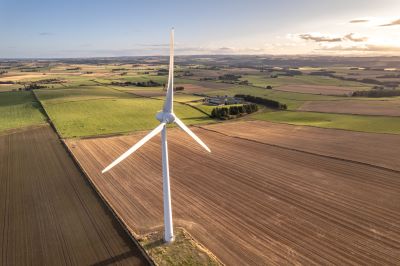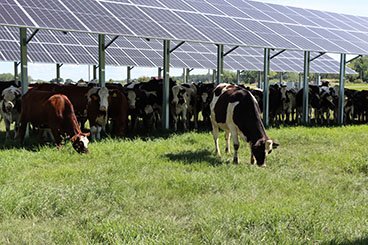Ottawa launches new collaborative approach to build a green Prairies economy
 The federal government has launched a new approach to work collaboratively with the provinces to build a green Prairies economy as Canada transitions to a net-zero future.
The federal government has launched a new approach to work collaboratively with the provinces to build a green Prairies economy as Canada transitions to a net-zero future.
Ottawa launched its “Framework to Build a Green Prairie Economy” in December by making a $10-million investment in Winnipeg-based NFI Group. NFI will use the funding to build new zero-emission transit buses and motorcoaches and modernize its Winnipeg motorcoach manufacturing facility to increase production capacity.
 “There’s a shift going on towards a green economy and we feel the Prairies need to be front and centre leading the way,” Dan Vandal (photo at left), Manitoba MP for Saint Boniface-Saint Vital and minister responsible for Prairies Economic Development Canada (PrairiesCan), told Research Money.
“There’s a shift going on towards a green economy and we feel the Prairies need to be front and centre leading the way,” Dan Vandal (photo at left), Manitoba MP for Saint Boniface-Saint Vital and minister responsible for Prairies Economic Development Canada (PrairiesCan), told Research Money.
“The goal of the Framework is to build a strong, resilient economy with good-paying jobs for people who live on the Prairies,” he said.
The Framework “represents a commitment by the federal government to work differently, to enhance local cooperation and engagement, and ensure responsive federal programs,” according to PrairiesCan.
The regional funding agency has committed $100 million over the next three years of its existing funding to support projects aligned with the Framework’s priorities.
Vandal emphasized that a major focus of the Framework is to increase collaboration among governments, both within federal departments and agencies, as well as between Ottawa and Alberta, Saskatchewan and Manitoba. “Collaboration is the key word here.”
PrairiesCan conducted “hundreds of consultations” from February to July 2023 before launching the Framework, including with governments, businesses, industry, labour unions and Indigenous governments, he said. The consultation effort included more than 130 engagement meetings and 130 submissions, involving more than 500 organizations.
Bill C-235, the proposed legislation for the Framework, passed third and final reading in the House of Commons on December 7, 2022, by a vote of 176 in favour and 137 opposed.
The Liberals and NDP voted to pass the legislation. However, in what may spell potential trouble for the new Framework, the Conservatives and Bloc Québécois voted against the bill.
Vandal maintained the Conservative Party are “in disrupting mode and anything the federal government does they’re going to criticize.”
Critics of the new legislation contend the Framework interferes with provincial jurisdiction and duplicates work already occurring at the provincial level.
However, Vandal said he has had “good meetings” with the governments of Alberta and Manitoba to discuss the Framework. “The last thing on our mind is trying to jurisdictionally overreach,” he said. “Our door is open and we’re open to suggestions.”
Ottawa hasn’t heard any reaction to the Framework from Alberta’s United Conservative Party government since the legislation was enacted in December, Vandal said. “We’re taking a positive attitude, we’re going to be reaching out to them. And we’ll get some response very soon, I hope.”
Several federal departments, such as Natural Resources Canada, Environment and Climate Change Canada, and Labour, are investing hundreds of millions of dollars in projects and programs to support the net-zero transition, Vandal said. Ottawa is hoping the Prairie provinces will also see the new Framework as a vehicle for collaborative and coordinated investment.
Vandal said he was in Alberta about a year ago to announce a $10-million investment by PrairiesCan in Alberta’s fledgling hydrogen economy, with the funding going to Edmonton Global (the Edmonton region's business development agency), the Alberta Motor Transport Association and the University of Alberta.
The federal investment “was very well received and strong partnerships were made,” he said. “The Framework intends to continue those partnerships and invest when it makes sense to create opportunity and better jobs for Albertans.”
Legislation requires federal government to consult with provinces
The Building a Green Prairie Economy Act was introduced as a Private Member’s Bill by Jim Carr, Liberal MP for Winnipeg South Centre, before his death on December 12, 2022, at age 71 after a years-long battle with cancer. He died three days before his bill was enacted and became law.
The legislation for the Framework for a Green Economy states that the federal minister for economic development in the Prairie provinces “must” – in collaboration with the ministers of the environment, transport, industry, agriculture and agri-food, finance, and natural resources – “develop a framework to coordinate local cooperation and engagement in the implementation of federal programs across various sectors, with the objective of building a green economy in the Prairie provinces.”
In developing the framework, the federal minister “must consult with provincial government representatives responsible for transportation, environment and employment, and with municipalities, Indigenous governing bodies, the private sector and representatives of employers and employees in that sector,” the legislation stipulates.
The framework “must include measures that promote economic sustainability and growth and employment in the Prairie provinces” by:
- addressing the limited or non-existent transportation options in small cities and communities, and advancing innovative solutions for public transportation services in those cities and communities.
- fostering job creation and skills transfer, as evidenced by increased employment, in Prairie regions that rely on traditional energy industries to enable them to build a net-zero emissions green economy and mitigate their impact on climate change.
- prioritizing projects that generate natural infrastructure and a clean environment, such as tree-planting initiatives, solar energy projects and environmental management of the boreal forest, and that make use of all sources of energy, including nuclear energy.
- supporting the continued development of clean energy in fields such as agriculture, forestry, transportation, manufacturing and tourism.
- establishing programs and projects that stimulate a green economy, in a way that takes into account local circumstances, and the participation of local businesses, governments and civil society organizations.
- preparing infrastructure projects that facilitate adaptation to climate change and mitigation of its adverse effects.
The legislation also requires the federal minister for economic development on the Prairies to prepare a report on the progress and effectiveness of the Framework within two years after the Act comes into force, and every five years after that.
Some critics argue that the Framework’s emphasis on the “continued development of clean energy” will exclude production of oil and natural gas, which is important to both Alberta’s and Saskatchewan’s economies.
But Vandal said the Framework’s reference to making use of “all sources of energy” includes natural gas production and gas-generated power, providing it’s coupled with carbon capture and storage, and that such projects “can play a part toward net-zero emissions and sustainability.”
“We know that the Prairies have always been an energy powerhouse and they always will be,” he added. “We’re trying to help that transition to a greener growth.”
New approach has lots of critics
Prior to Bill C-235 being passed, Cliff Cullen, the Manitoba government’s minister of economic development, investment and trade, told the House of Commons Standing Committee on Industry and Technology that the legislation “would create unnecessary bureaucracy and a top-down approach that would delay moving forward the green economy, delay decisions on research and development, and stifle innovation that is already occurring.”
Bronwyn Eyre, Saskatchewan’s minister of justice, told the same committee that Bill C-235 would require federal ministers to develop a framework for the implementation of federal programs, “which to us in Saskatchewan sounds pretty top-down, pretty definitive language, and what we call here ‘assertive federalism.’”
Catherine Brownlee, president of Alberta Enterprise Group, said Alberta businesses are already on the cutting edge of technological innovation, emissions reduction and green innovation. “Given that Alberta is already a leader in this field, it does cause us to wonder as business leaders what the positive impact would be of another Ottawa-based framework,” she said.
Pat Kelly, Conservative MP for Calgary Rocky Ridge, speaking in the House of Commons, said Bill C-235 “would impose a process to create a federal framework for the imposition of federal policies on three provinces that do not want it. They did not ask for it. They do not like this [federal] government. They disagree with this government.”
Shannon Stubbs, Conservative MP for Lakeland, Alberta, told the House of Commons that Ottawa “does not get the realities or priorities of prairie life, and the very best way the federal government can help the Prairies to develop and diversify their economies, to create jobs and reduce emissions, is to get out of the way. We are already doing it.”
The Framework will impose a complex bureaucratic process spanned across three provinces and at least five federal departments, “just to create a plan that is likely to mostly feature predetermined federal Liberal government ideology and goals,” she said.
“The federal government would do better to listen to innovators and fix the major problem in Canada that they call the valley of death, where years of risk-taking, innovation, collaboration, creativity, inventiveness, research and development, and money go to die before ever making it to real commercialized, usable, feasible technology in Canada, making innovators go elsewhere,” Stubbs said.
Jim Carr, in the March 2022 House of Commons debate about Bill C-235, said his bill “represents a new way of doing business as a nation.” Rather than being about jurisdictional overreach, he said, the bill “mandates collaboration, cooperation and relationship building.”
Despite stating that it aims to coordinate local cooperation and engagement in the implementation of federal programs, the Building a Green Prairies Economy Act touches on areas of both federal and provincial jurisdiction, according to a report published by McGill University law student Anne Campbell in the McGill Journal of Sustainable Development Law.
It will be interesting to see whether the Act fosters cooperative federalism through shared investment and implementation across all levels of government, or if it will cause further jurisdictional conflict and western alienation, Campbell wrote.
“Will the prioritization of inter-jurisdictional coordination and cooperation through the framework lead to an increase in cooperative federalism on key green economy projects given stakeholders’ increased role?” she asked.
“Or, will the framework be plagued by regional, political and jurisdictional differences, thus decreasing its long-term effectiveness? Only time will tell how and whether the [Building a Green Prairies Economy Act] shapes the development of the green economy in the Prairies.”
R$
Events For Leaders in
Science, Tech, Innovation, and Policy
Discuss and learn from those in the know at our virtual and in-person events.
See Upcoming Events
You have 0 free articles remaining.
Don't miss out - start your free trial today.
Start your FREE trial Already a member? Log in
By using this website, you agree to our use of cookies. We use cookies to provide you with a great experience and to help our website run effectively in accordance with our Privacy Policy and Terms of Service.





